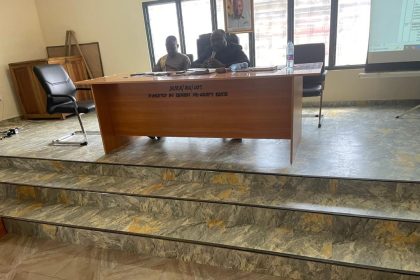The Bank of Ghana (BoG) has intensified its public sensitization campaign on consumer protection and financial literacy, urging Ghanaians to verify the licensing status of financial institutions before engaging in any financial transactions.
Mr Augustine Amoako Donkor, Head of the Credit Reporting and Financial Literacy Office at BoG, at a sensitisation outreach emphasised that one of the central bank’s core mandates under the Banks and Specialised Deposit-Taking Institutions Act, 2016 (Act 930), was to ensure consumer protection through robust regulatory oversight.
Speaking at a financial literacy outreach in Koforidua, Mr Donkor addressed several informal sector groups including members of the Ghana United Barbers Association, National Caterers Association, hairdressers, seamstresses, tailors, market women, and mobile money vendors.
He explained that the central bank’s consumer protection framework included directives, rules, and regulations designed to safeguard customer interests.
“The Bank of Ghana is mandated to put in place measures to protect the interests of consumers,” he said.
“These include regulatory frameworks, rules, directives, and regulations that ensure licensed financial institutions operate in a manner that upholds customer protection.”
Mr Donkor noted that while financial literacy rates were previously low, leaving customers vulnerable to exploitation, its ongoing education campaigns have significantly improved public understanding of financial products and consumer rights.
“Customers today are less vulnerable because there are more protective regulations and higher literacy levels,” he added.
Despite these gains, he cautioned that emerging threats such as financial fraud continued to pose serious risks.
“Because of the evolving nature of the financial landscape, issues like fraud keep emerging. Fraudsters sometimes even collaborate with insiders to defraud customers,” he said.
He stressed that public sensitization and financial literacy campaigns remained among the most effective tools for reducing consumer vulnerability.
“Such programmes help customers understand their rights and responsibilities, improve their confidence, and enable them to interact effectively with financial service providers,” Mr Donkor stated.
He urged the public to always verify whether a financial institution was duly licensed and supervised by the appropriate regulatory authority.
“Before you decide to do business with any financial institution, the first thing to ask is: is this institution licensed and regulated by a financial authority such as the Bank of Ghana, the National Insurance Commission, the National Pensions Regulatory Authority, or the Securities and Exchange Commission?” he advised.
Mr Donkor warned that dealing with unlicensed institutions always exposed customers to illegality and loss.
“If you do business with an unlicensed institution and something goes wrong, the Bank of Ghana cannot intervene because such entities operate outside the legal financial framework,” he explained.
He added that customers could identify licensed institutions by requesting to see their license, which all financial institutions were legally required to display visibly in their banking halls.
“Look out for the Bank of Ghana logo, the name of the institution, and the signatures of the three governors on the license. When in doubt, contact the Bank of Ghana directly for verification,” he advised.
Mr Donkor also cautioned that illegal financial operators often set up in less prominent areas to avoid detection, saying: “Such operators tend to promise unrealistically high returns to attract unsuspecting customers, and by the time authorities identify them, they often vanish, making recovery efforts difficult.”
He encouraged the public to report suspected illegal financial operators to BoG or the appropriate security agencies.
“We depend on the public to report such institutions because the Bank of Ghana cannot be physically present everywhere. Protect your money by ensuring the institutions you deal with are licensed,” he emphasised.
In addition to consumer protection, Mr Donkor reiterated that financial literacy empowers individuals to make informed decisions about savings, borrowing, and investments.
“Financial literacy enables people to plan effectively, control their finances, and avoid pitfalls such as mobile money fraud and poor loan management,” he said.
He explained that loan repayment behaviour was monitored under the Credit Reporting Act, 2007 (Act 726), through licensed credit bureaus, which share data with lenders to assess borrowers’ creditworthiness.
“Repaying loans promptly builds a good credit history and ensures continued access to financial services,” he stated.
Participants were educated on mobile money safety, responsible borrowing, proper cheque writing, and identifying fraudulent schemes.
BoG also reminded attendees that they could transact in any local language within banking halls, as English proficiency was not a requirement for receiving financial services.
Mr Donkor urged individuals and informal sector workers to take proactive steps in safeguarding their finances through continuous education, verification of licensed institutions, and responsible financial behaviour.





